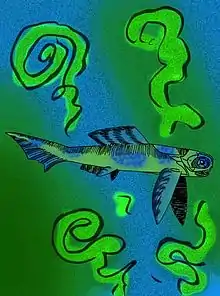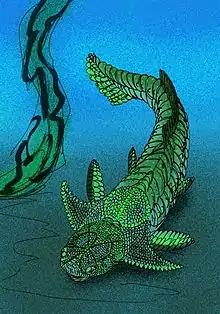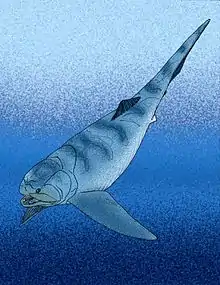Walterosteus
Walterosteus is a genus of small selenosteid arthrodire placoderms known from the Upper Frasnian Kellwasserkalk facies of Late Devonian Germany[1]:96 and Morocco.[2]
| Walterosteus | |
|---|---|
 | |
| W. lelievrei | |
| Scientific classification | |
| Kingdom: | |
| Phylum: | |
| Subphylum: | |
| Class: | |
| Order: | |
| Suborder: | |
| Infraorder: | |
| Superfamily: | |
| Family: | |
| Genus: | Walterosteus |
| Type species | |
| Walterosteus pachyostoides Stensiö 1959 | |
| Species | |
| |
| Synonyms | |
| |
Walterosteus is very similar to the other Kellwasserkalk selenosteids. This similarity lead Denison (1978) to synonymize the genus, together with Ottonosteus (O. jaekeli = E. hermanni), into Enseosteus, claiming that the former two genera are too similar to Enseosteus to merit separate genus status.[1] Rücklin (2011) agrees with Denison's synonymizing of Ottonosteus, but rejects Denison's synonymization of Walterosteus, claiming how Walterosteus has a contact between the rostral plate and the pineal plate, which Enseosteus does not.[2]
Etymology
The genus was named by Erik Stensiö to commemorate the contributions done by Walter Gross, a German specialist on Paleozoic fishes, and his important contributions to the understanding of the overall anatomy of arthrodire placoderms.
References
- Denison, Robert (1978). Handbook of Paleoichthyology, Volume 2, Placodermi. New York: Gustav Fischer Verlage. p. 98. ISBN 9780895740274.
- RÜCKLIN, MARTIN (January 14, 2011). "First selenosteid placoderms from the eastern Anti-Atlas of Morocco; osteology, phylogeny and palaeogeographical implications". Palaeontology. 56 (1): 25–62. doi:10.1111/j.1475-4983.2010.01026.x.


